Behind the Scenes
Support from readers like you makes it possible for us to produce the high-quality journalism that you expect and rely on. We wanted to share what goes on behind the scenes—so we asked our editors to describe something about what goes into reporting and writing the stories you see in Harvard Magazine.
We hope you will consider making a donation to Harvard Magazine so we can continue to bring you this type of thoughtful, in-depth journalism. As an independent nonprofit, we cannot do it without your support.
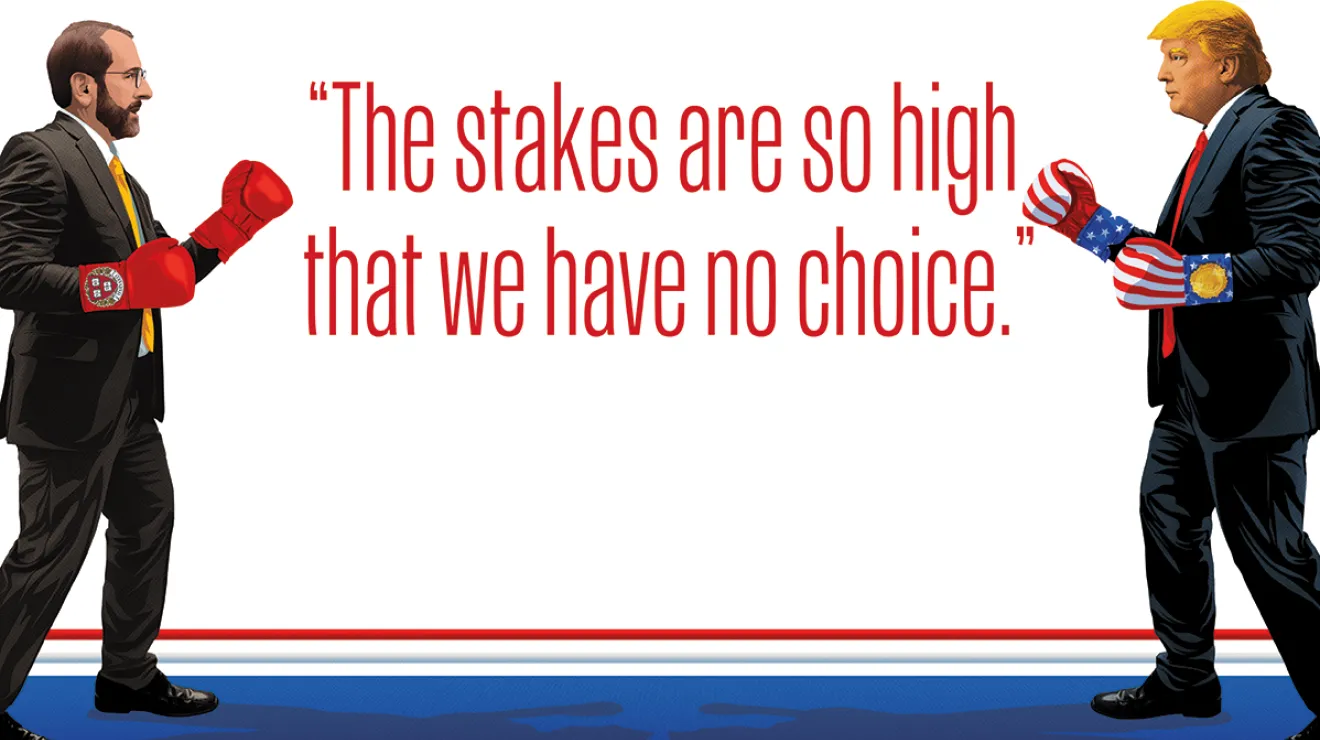 Joanna Weiss began her new role as editor of Harvard Magazine in the midst of Harvard’s historic battle with the Trump administration. As a College alum, she reflected on what she would want from her alumni magazine during this pivotal moment. The result: a comprehensive guide detailing key issues, people, and what’s at stake for Harvard. Joanna shares her insights into the engaging format, the striking cover art, and the reactions of readers. Thanks to your support, our editorial team was able to dedicate time to researching and reporting on these important issues while presenting them in new and exciting ways. Read more here.
Joanna Weiss began her new role as editor of Harvard Magazine in the midst of Harvard’s historic battle with the Trump administration. As a College alum, she reflected on what she would want from her alumni magazine during this pivotal moment. The result: a comprehensive guide detailing key issues, people, and what’s at stake for Harvard. Joanna shares her insights into the engaging format, the striking cover art, and the reactions of readers. Thanks to your support, our editorial team was able to dedicate time to researching and reporting on these important issues while presenting them in new and exciting ways. Read more here.
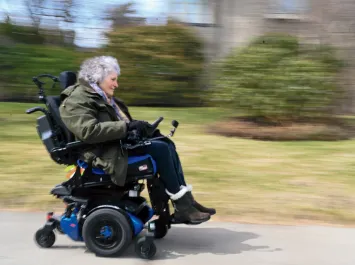 Lydialyle Gibson’s May-June feature “Quality of Care” examines the groundbreaking work of Harvard Medical School professor Lisa Iezzoni, who has spent decades researching doctors’ perceptions of patients with disabilities and the unmet needs this population faces. Iezzoni, who has multiple sclerosis and uses a wheelchair, shares her own personal experience of living with a disability and overcoming the prejudices of others. Thanks to reader support, Lydia was able to spend the time researching, reading, and interviewing Iezzoni and her colleagues, discovering that there are many misperceptions about people with disabilities, and that society needs to be more open to talking about the topic. Read more from her here.
Lydialyle Gibson’s May-June feature “Quality of Care” examines the groundbreaking work of Harvard Medical School professor Lisa Iezzoni, who has spent decades researching doctors’ perceptions of patients with disabilities and the unmet needs this population faces. Iezzoni, who has multiple sclerosis and uses a wheelchair, shares her own personal experience of living with a disability and overcoming the prejudices of others. Thanks to reader support, Lydia was able to spend the time researching, reading, and interviewing Iezzoni and her colleagues, discovering that there are many misperceptions about people with disabilities, and that society needs to be more open to talking about the topic. Read more from her here.
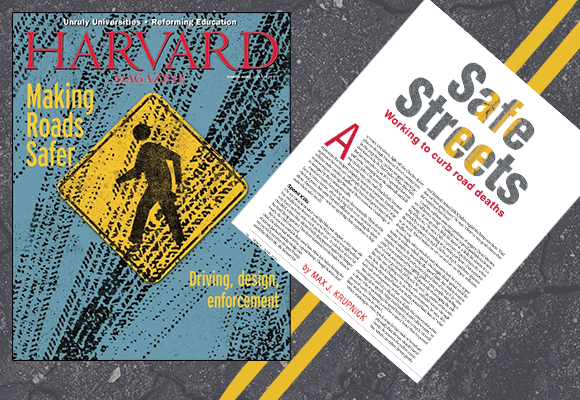 Max Krupnick’s March-April cover feature explores what makes American roads so dangerous for pedestrians, drivers, and cyclists, and what can be done on the local, state, and federal levels to make them safer for everyone. Thanks to reader support, Max dedicated the time to research and learn about the variety of fields that contribute to street safety while interviewing experts across the Harvard community to understand this complex topic. Read more from him here.
Max Krupnick’s March-April cover feature explores what makes American roads so dangerous for pedestrians, drivers, and cyclists, and what can be done on the local, state, and federal levels to make them safer for everyone. Thanks to reader support, Max dedicated the time to research and learn about the variety of fields that contribute to street safety while interviewing experts across the Harvard community to understand this complex topic. Read more from him here.
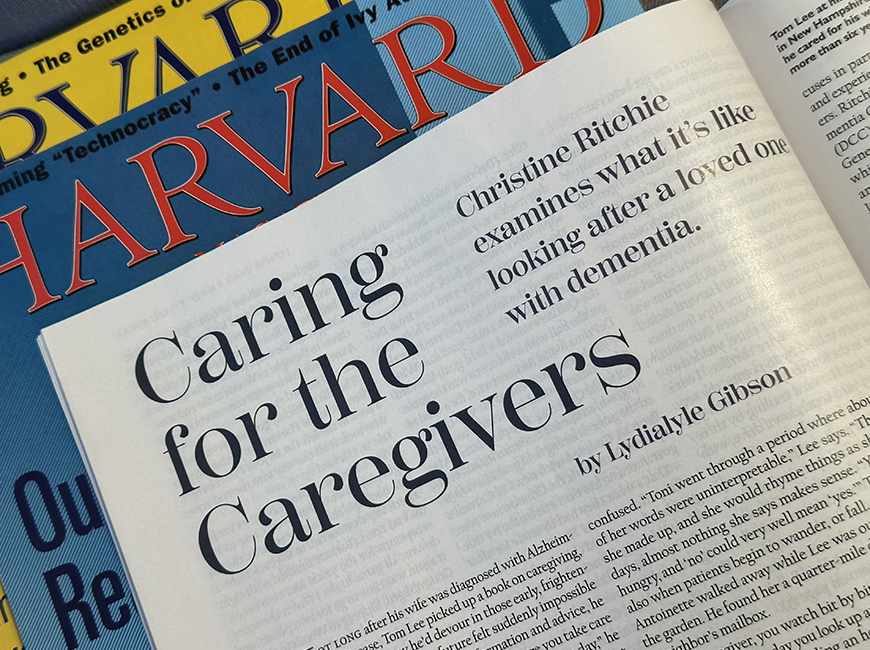 Lydialyle Gibson’s January-February cover feature probes the emotional, financial, and physical challenges of caring for a loved one with dementia. Thanks to reader support, Lydia was able to take the time needed to examine this complex topic—interviewing physicians, psychologists, and social workers at Massachusetts General Hospital’s Dementia Care Collaborative, reading the latest studies along with a poignant memoir from a Harvard professor, speaking to almost a dozen caregivers and listening to their stories of heartbreak, loneliness, and love. Read Lydia’s reflections about reporting on dementia caregiving here.
Lydialyle Gibson’s January-February cover feature probes the emotional, financial, and physical challenges of caring for a loved one with dementia. Thanks to reader support, Lydia was able to take the time needed to examine this complex topic—interviewing physicians, psychologists, and social workers at Massachusetts General Hospital’s Dementia Care Collaborative, reading the latest studies along with a poignant memoir from a Harvard professor, speaking to almost a dozen caregivers and listening to their stories of heartbreak, loneliness, and love. Read Lydia’s reflections about reporting on dementia caregiving here.
 Jonathan Shaw’s cover feature on America’s housing problem explores the underlying reasons for the crisis by looking beyond what is often covered in the news. His research led him to the important work of Harvard’s Joint Center for Housing Studies, and analysis of their data, interviews with scholars across multiple disciplines, and research into the work of alumni practitioners in the field. Thanks to reader support, Jonathan was able to report at length on the topic for the first time. Read more here.
Jonathan Shaw’s cover feature on America’s housing problem explores the underlying reasons for the crisis by looking beyond what is often covered in the news. His research led him to the important work of Harvard’s Joint Center for Housing Studies, and analysis of their data, interviews with scholars across multiple disciplines, and research into the work of alumni practitioners in the field. Thanks to reader support, Jonathan was able to report at length on the topic for the first time. Read more here.
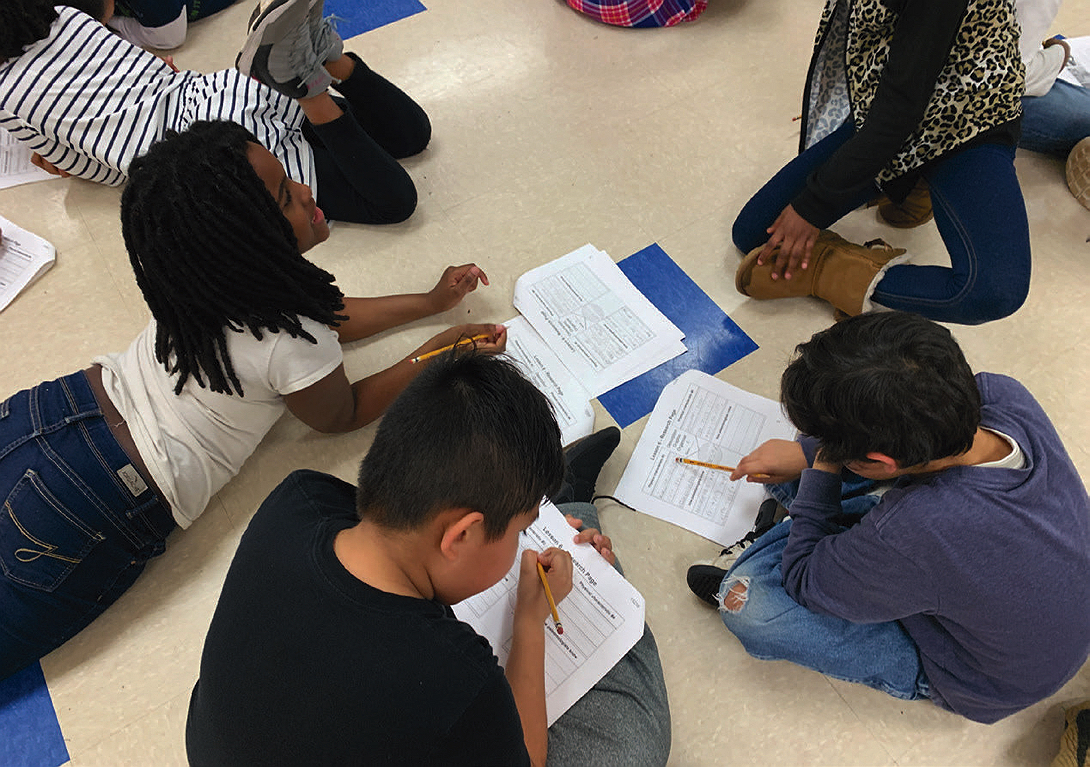 Nina Pasquini’s curiosity about learning loss during the pandemic led her to the Harvard Graduate School of Education, where she spoke with professors about literacy and learned about the important work of the Harvard READS Lab. Her comprehensive feature discusses the challenges facing literacy educators across America—including the difficulties in integrating research, policy, and practice. Thanks to reader support, Nina was able to dedicate the time to understand the research, speak to practitioners out in the field, and hear from the students who have overcome reading difficulties. Read more here.
Nina Pasquini’s curiosity about learning loss during the pandemic led her to the Harvard Graduate School of Education, where she spoke with professors about literacy and learned about the important work of the Harvard READS Lab. Her comprehensive feature discusses the challenges facing literacy educators across America—including the difficulties in integrating research, policy, and practice. Thanks to reader support, Nina was able to dedicate the time to understand the research, speak to practitioners out in the field, and hear from the students who have overcome reading difficulties. Read more here.
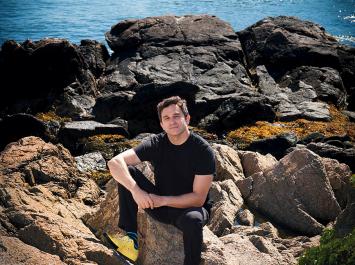 Jonathan Shaw describes how Project CETI’s pioneering effort to decode sperm whale vocalizations came together—an idea that emerged at the Radcliffe Institute in 2017 when marine biologist David Gruber met a cryptographer and an expert in artificial intelligence—and the work it took to cover the story. Thanks to reader support, Harvard Magazine was able to follow the story as it developed. Read more from Jon about covering this incredible research.
Jonathan Shaw describes how Project CETI’s pioneering effort to decode sperm whale vocalizations came together—an idea that emerged at the Radcliffe Institute in 2017 when marine biologist David Gruber met a cryptographer and an expert in artificial intelligence—and the work it took to cover the story. Thanks to reader support, Harvard Magazine was able to follow the story as it developed. Read more from Jon about covering this incredible research.
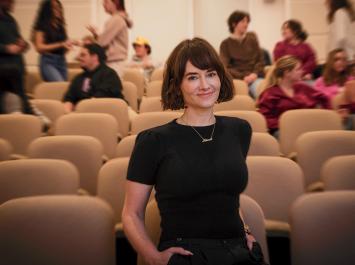 Max Krupnick wondered after the October 7 terrorist attack: is anyone at Harvard studying hatred and group behavior? This led him to the work of professor of psychology Mina Cikara, who focuses her research on the social psychology of antagonism. Thanks to donor support, Max was able to take the time to read through Cikara’s papers and interview her and several of her associates at length, all for you to have a better understanding of her important work. Read more.
Max Krupnick wondered after the October 7 terrorist attack: is anyone at Harvard studying hatred and group behavior? This led him to the work of professor of psychology Mina Cikara, who focuses her research on the social psychology of antagonism. Thanks to donor support, Max was able to take the time to read through Cikara’s papers and interview her and several of her associates at length, all for you to have a better understanding of her important work. Read more.
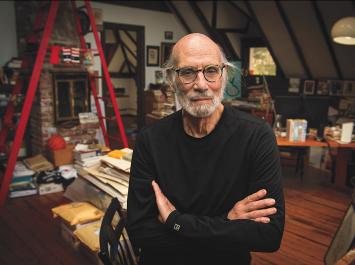 Craig Lambert, former deputy editor of Harvard Magazine, shares his insights into his feature profile about bestselling novelist and psychiatrist Stephen Bergman ’66, M.D. ’73. Thanks to reader support, Harvard Magazine is able to hire the most qualified writers for the assignment. Read about Craig’s experience meeting up with Bergman after 39 years!
Craig Lambert, former deputy editor of Harvard Magazine, shares his insights into his feature profile about bestselling novelist and psychiatrist Stephen Bergman ’66, M.D. ’73. Thanks to reader support, Harvard Magazine is able to hire the most qualified writers for the assignment. Read about Craig’s experience meeting up with Bergman after 39 years!
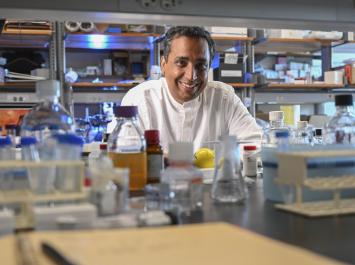 Jonathan Shaw shares what led him to feature Sharad Ramanathan in the January-February issue and the breakthrough, a “holy grail” in biology, that he learned as a result. Thanks to reader support, Jonathan has been able to write, report, and document the evolution of stem cell science over the past two decades. Read more from Jon about his process here.
Jonathan Shaw shares what led him to feature Sharad Ramanathan in the January-February issue and the breakthrough, a “holy grail” in biology, that he learned as a result. Thanks to reader support, Jonathan has been able to write, report, and document the evolution of stem cell science over the past two decades. Read more from Jon about his process here.
 John Rosenberg tapped into a Harvard Magazine “special strength” to provide you with an in-depth feature on Harvard’s 30th president, Claudine Gay. To get a fuller understanding of Gay’s academic work, he started where it all began; he went to the University Archives and read her dissertation. He then moved on to all her journals, and everything else in between. John interviewed advisors, mentors, mentees, and former students, along with Gay herself, all to give you the broadest picture possible of the life, scholarship, and leadership of our new president. Thanks to reader support, he was able to be thorough and thoughtful with his approach, taking the time to write and edit with the input from colleagues. Read more from John here.
John Rosenberg tapped into a Harvard Magazine “special strength” to provide you with an in-depth feature on Harvard’s 30th president, Claudine Gay. To get a fuller understanding of Gay’s academic work, he started where it all began; he went to the University Archives and read her dissertation. He then moved on to all her journals, and everything else in between. John interviewed advisors, mentors, mentees, and former students, along with Gay herself, all to give you the broadest picture possible of the life, scholarship, and leadership of our new president. Thanks to reader support, he was able to be thorough and thoughtful with his approach, taking the time to write and edit with the input from colleagues. Read more from John here.
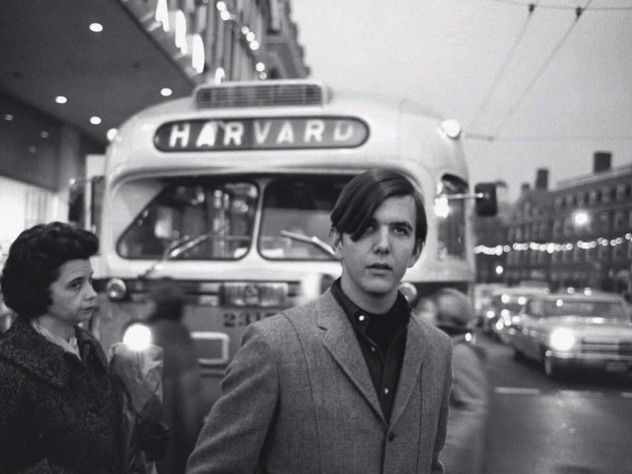 Nancy Walecki’s curiosity about her father’s friend, legendary rocker Gram Parsons, led her to dig deep into the University Archives and seek out the people that knew him best during his short but influential time at Harvard. Thanks to reader support, Nancy was able to explore the time Parson’s spent at Harvard—interviewing sources, soliciting stories from alums—all to reveal a period of the musician’s life that most biographers have not covered. Read more.
Nancy Walecki’s curiosity about her father’s friend, legendary rocker Gram Parsons, led her to dig deep into the University Archives and seek out the people that knew him best during his short but influential time at Harvard. Thanks to reader support, Nancy was able to explore the time Parson’s spent at Harvard—interviewing sources, soliciting stories from alums—all to reveal a period of the musician’s life that most biographers have not covered. Read more.
 Nancy Walecki discusses, in our first behind-the-scenes video, the steps she takes writing an article for Harvard Magazine. She shares what inspires her story ideas, what goes into her detailed reporting, and how one of the coolest things she knows helps make her writing more vivid. Thanks to reader support, Nancy can dedicate a considerable amount of time to learning as much as possible about a topic to ensure that her reporting is thorough and balanced. Hear from Nancy here.
Nancy Walecki discusses, in our first behind-the-scenes video, the steps she takes writing an article for Harvard Magazine. She shares what inspires her story ideas, what goes into her detailed reporting, and how one of the coolest things she knows helps make her writing more vivid. Thanks to reader support, Nancy can dedicate a considerable amount of time to learning as much as possible about a topic to ensure that her reporting is thorough and balanced. Hear from Nancy here.
![]() Lydialyle Gibson shares insights about her January-February cover story featuring Harvard’s Scholars at Risk Program and the responsibility she feels to “get things right” when telling other people’s stories. Thanks to reader support, Lydialyle was able to dedicate the energy and time into interviewing over twenty people and work on multiple drafts, all to convey the important work of these scholars whose lives are under threat. Read more from Lydialyle here.
Lydialyle Gibson shares insights about her January-February cover story featuring Harvard’s Scholars at Risk Program and the responsibility she feels to “get things right” when telling other people’s stories. Thanks to reader support, Lydialyle was able to dedicate the energy and time into interviewing over twenty people and work on multiple drafts, all to convey the important work of these scholars whose lives are under threat. Read more from Lydialyle here.
 Lydialyle Gibson explores the vast collection of Harvard Library’s Judaica Division—the largest collection of its kind outside of the National Library of Israel. Thanks to supporters of editorial independence, Lydialyle was able expand her story into a feature to share with you the importance of this special archive. Read more from Lydialyle.
Lydialyle Gibson explores the vast collection of Harvard Library’s Judaica Division—the largest collection of its kind outside of the National Library of Israel. Thanks to supporters of editorial independence, Lydialyle was able expand her story into a feature to share with you the importance of this special archive. Read more from Lydialyle.
 John Rosenberg reflects on the significance of the cover images chosen for the July-August 2020 and 2022 Commencement issues: one of an empty Tercentenary Theater during the early uncertain days of the pandemic, and another, two years later, with graduates back on campus celebrating together once again. These powerful images capture the emotions of the times. Thanks to reader support, Harvard Magazine is able to provide you with the most comprehensive coverage of Commencement each year. Read his insights here.
John Rosenberg reflects on the significance of the cover images chosen for the July-August 2020 and 2022 Commencement issues: one of an empty Tercentenary Theater during the early uncertain days of the pandemic, and another, two years later, with graduates back on campus celebrating together once again. These powerful images capture the emotions of the times. Thanks to reader support, Harvard Magazine is able to provide you with the most comprehensive coverage of Commencement each year. Read his insights here.
 Jonathan Shaw, after reading a paper in a scientific journal, sought out the author, a professor at Harvard Medical School, who put him in touch with colleagues developing the cutting-edge medical robots featured in the cover story for the May-June issue. Thanks to reader support, Jonathan was able to get direct access to the work of these scientists and the patients taking part in their clinical trials, because they value our reporting and reputation. Read his insights.
Jonathan Shaw, after reading a paper in a scientific journal, sought out the author, a professor at Harvard Medical School, who put him in touch with colleagues developing the cutting-edge medical robots featured in the cover story for the May-June issue. Thanks to reader support, Jonathan was able to get direct access to the work of these scientists and the patients taking part in their clinical trials, because they value our reporting and reputation. Read his insights.
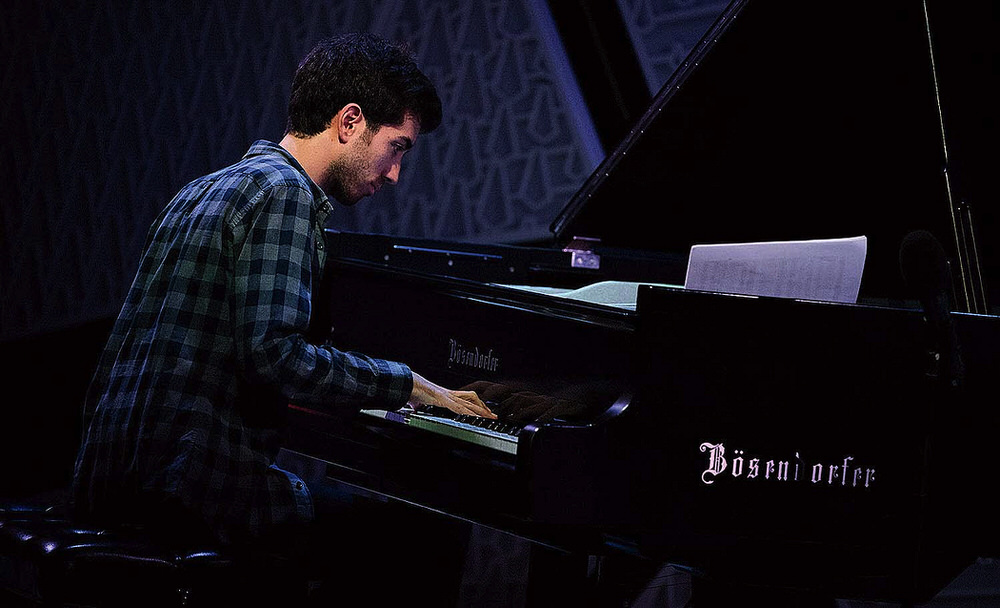 Nancy Kathryn Walecki shares her insights into the importance of spending time and experiencing interview subjects while they are in their element. Thanks to reader support, Nancy Kathryn had the opportunity to travel and witness jazz composer Phillip Golub in action for her March-April piece.
Nancy Kathryn Walecki shares her insights into the importance of spending time and experiencing interview subjects while they are in their element. Thanks to reader support, Nancy Kathryn had the opportunity to travel and witness jazz composer Phillip Golub in action for her March-April piece.
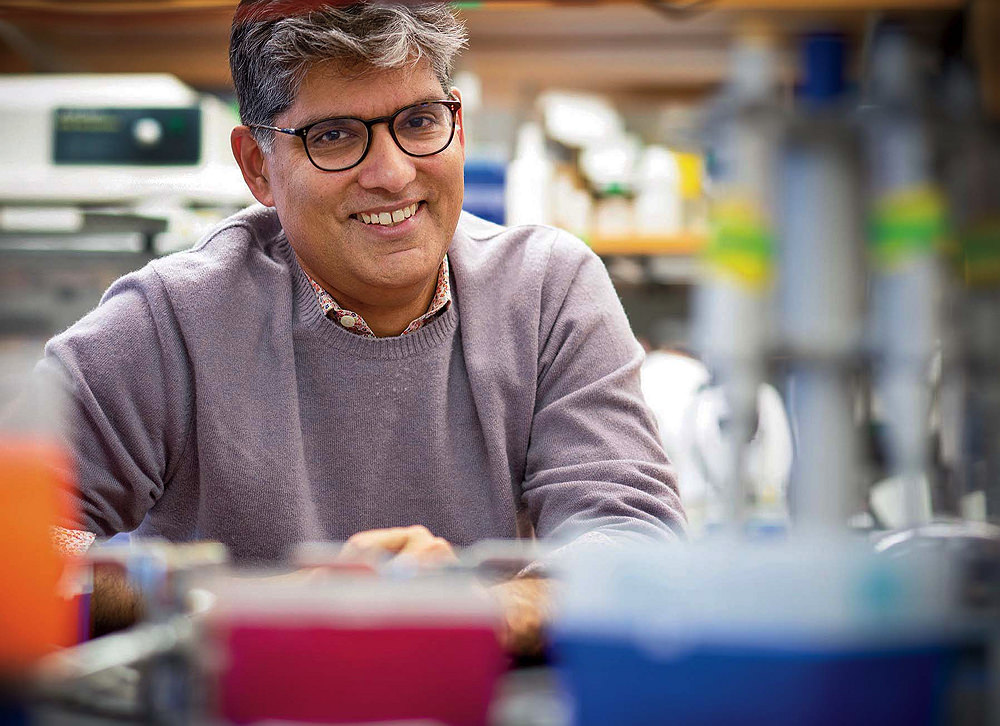 Lydialyle Gibson shares her insights into the fascinating work of neuroscientists Sandeep Robert Datta and Venkatesh Murthy for the cover story of the November-December issue. She reflects on what it’s like to interview for print and broadcast and how the same subject can take on very different angles depending on the medium. Thanks to reader support, Lydialyle was able to dedicate the time to go beyond the feature and explore more about this timely subject and reveal that scientists don’t even know what smell actually is. Read more from Lydialyle here.
Lydialyle Gibson shares her insights into the fascinating work of neuroscientists Sandeep Robert Datta and Venkatesh Murthy for the cover story of the November-December issue. She reflects on what it’s like to interview for print and broadcast and how the same subject can take on very different angles depending on the medium. Thanks to reader support, Lydialyle was able to dedicate the time to go beyond the feature and explore more about this timely subject and reveal that scientists don’t even know what smell actually is. Read more from Lydialyle here.
 Jonathan Shaw's extensive reporting for Harvard Magazine on infectious diseases—and on the SARS outbreak of 2003 in particular—gave him the background knowledge and understanding to realize that a health crisis was unfolding in the early days of 2020. Jonathan had the opportunity to be the first to interview Harvard researchers who were planning collaborations to combat the novel coronavirus with Chinese colleagues in February 2020. Thanks to your support, Jonathan has been able to continue covering the latest COVID-19 research. He has written more than 14 articles about the subject to date. Read his reflections on his latest piece here.
Jonathan Shaw's extensive reporting for Harvard Magazine on infectious diseases—and on the SARS outbreak of 2003 in particular—gave him the background knowledge and understanding to realize that a health crisis was unfolding in the early days of 2020. Jonathan had the opportunity to be the first to interview Harvard researchers who were planning collaborations to combat the novel coronavirus with Chinese colleagues in February 2020. Thanks to your support, Jonathan has been able to continue covering the latest COVID-19 research. He has written more than 14 articles about the subject to date. Read his reflections on his latest piece here.
 Jacob Sweet's deep dive into the subject of disinformation led him to realize that the more researchers he spoke with, the more diverse their opinions on the topic, and the more interesting his own project became—thus his feature for the July-August issue. Thanks to your support, Jacob was able to dedicate the time he needed to research and interview an array of scholars from across disciplines to bring you their various perspectives. Read Jacob’s reflections here.
Jacob Sweet's deep dive into the subject of disinformation led him to realize that the more researchers he spoke with, the more diverse their opinions on the topic, and the more interesting his own project became—thus his feature for the July-August issue. Thanks to your support, Jacob was able to dedicate the time he needed to research and interview an array of scholars from across disciplines to bring you their various perspectives. Read Jacob’s reflections here.
 Jean Martin reflects on the history, challenges, and importance of the magazine’s Vita department. Thanks to readers’ support, Harvard Magazine has shared for more than 40 years the interesting lives of famous and lesser-known individuals—in brief. Read Jean's insights here.
Jean Martin reflects on the history, challenges, and importance of the magazine’s Vita department. Thanks to readers’ support, Harvard Magazine has shared for more than 40 years the interesting lives of famous and lesser-known individuals—in brief. Read Jean's insights here.
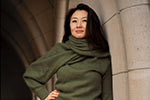 Lydialyle Gibson shares her insights on writing profiles, the process she follows in her work, and how the ideas of Harvard Law School’s Watson professor of law, Jeannie Suk Gersen, challenged her own thinking. Thanks to reader support, Lydialyle was able to immerse herself in Gersen’s work and share with you the fascinating aspects of her kaleidoscopic career. Read her reflections.
Lydialyle Gibson shares her insights on writing profiles, the process she follows in her work, and how the ideas of Harvard Law School’s Watson professor of law, Jeannie Suk Gersen, challenged her own thinking. Thanks to reader support, Lydialyle was able to immerse herself in Gersen’s work and share with you the fascinating aspects of her kaleidoscopic career. Read her reflections.
 Jacob Sweet, after months of social distancing, became eager to learn about the psychological and social impacts of isolation and how they affect our everyday lives especially during the pandemic. What he found out was surprising and more interesting than he'd anticipated. Thanks to support from our readers, Jacob was able to dedicate his time fully to research, and, as a result, uncover an unusual perspective on the topic. Read his reflections here.
Jacob Sweet, after months of social distancing, became eager to learn about the psychological and social impacts of isolation and how they affect our everyday lives especially during the pandemic. What he found out was surprising and more interesting than he'd anticipated. Thanks to support from our readers, Jacob was able to dedicate his time fully to research, and, as a result, uncover an unusual perspective on the topic. Read his reflections here.
 Lydialyle Gibson reflects on the special importance for reporters of actual face-to-face contact in describing how she wrote a profile of New York Times columnist Ross Douthat ’02, an assignment that included her first in-person (socially distanced) interview since the pandemic struck. Thanks to readers support, Lydialyle was able to dedicate the time and attention she needed to research her subject thoroughly (countless hours of reading and interviewing), all to create the holistic and human-centered profile that she felt her subject and you deserve. Read Lydialyles’s insights here.
Lydialyle Gibson reflects on the special importance for reporters of actual face-to-face contact in describing how she wrote a profile of New York Times columnist Ross Douthat ’02, an assignment that included her first in-person (socially distanced) interview since the pandemic struck. Thanks to readers support, Lydialyle was able to dedicate the time and attention she needed to research her subject thoroughly (countless hours of reading and interviewing), all to create the holistic and human-centered profile that she felt her subject and you deserve. Read Lydialyles’s insights here.
 Drew Pendergrass shares insights into his process of writing personal essays for the Undergraduate column as a Ledecky Fellow, and about how the importance of time, reflection, editing, and great mentorship led him to become a stronger writer. Thanks to support from our readers, our staff writers are able to dedicate time to mentoring and training our undergraduate fellows to become skilled journalists. Read about Drew's process here.
Drew Pendergrass shares insights into his process of writing personal essays for the Undergraduate column as a Ledecky Fellow, and about how the importance of time, reflection, editing, and great mentorship led him to become a stronger writer. Thanks to support from our readers, our staff writers are able to dedicate time to mentoring and training our undergraduate fellows to become skilled journalists. Read about Drew's process here.
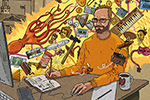 Jacob Sweet wrote a profile of Peabody professor of music Alexander Rehding, “One Small Step for Music,” focused on the music theorist and musicologist’s interstellar reach. Thanks to reader support, Jacob was able not only to immerse himself in Rehding’s research—on the Golden Record that NASA sent into space and on terrestrial music history and theory—but also to expand his own view of music. Read his insights here.
Jacob Sweet wrote a profile of Peabody professor of music Alexander Rehding, “One Small Step for Music,” focused on the music theorist and musicologist’s interstellar reach. Thanks to reader support, Jacob was able not only to immerse himself in Rehding’s research—on the Golden Record that NASA sent into space and on terrestrial music history and theory—but also to expand his own view of music. Read his insights here.
 Marina Bolotnikova wrote a profile of Winthrop professor of history and professor of African and African American studies Walter Johnson and his radical history of St. Louis. Support from our readers allowed her to take the time to embed herself in his world and really understand the context for his work—which helped her to appreciate not just Walter Johnson, but the story of her own hometown in a new light. Read her reflection.
Marina Bolotnikova wrote a profile of Winthrop professor of history and professor of African and African American studies Walter Johnson and his radical history of St. Louis. Support from our readers allowed her to take the time to embed herself in his world and really understand the context for his work—which helped her to appreciate not just Walter Johnson, but the story of her own hometown in a new light. Read her reflection.
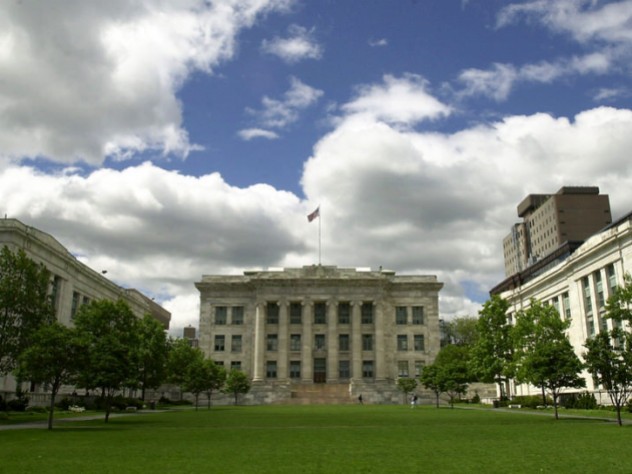 Jonathan Shaw wrote a comprehensive story about Harvard’s collaboration with Chinese researchers to develop diagnostics and therapies for treating the novel coronavirus: SARS-CoV-2. Jon has reported on topics like this for Harvard Magazine in the past and has built relationships with many of the scientists involved, and so he was able to put this crisis in context, in record time. And because people like you support his work, he was able to share this important scientific information with the public. Read his account.
Jonathan Shaw wrote a comprehensive story about Harvard’s collaboration with Chinese researchers to develop diagnostics and therapies for treating the novel coronavirus: SARS-CoV-2. Jon has reported on topics like this for Harvard Magazine in the past and has built relationships with many of the scientists involved, and so he was able to put this crisis in context, in record time. And because people like you support his work, he was able to share this important scientific information with the public. Read his account.
 John Rosenberg explained how our freelance budget, provided by donors, covered bare-bones travel expenses as well as the fee for a feature article about the state of journalism in the Internet era, reported and written by former Harvard Nieman Fellow, newspaper editor, and digital journalist Mark Travis. “Renewing the News” is a revealing, comprehensive account of the journalists and emerging journalism responding to a nationwide crisis. Read how the story came about.
John Rosenberg explained how our freelance budget, provided by donors, covered bare-bones travel expenses as well as the fee for a feature article about the state of journalism in the Internet era, reported and written by former Harvard Nieman Fellow, newspaper editor, and digital journalist Mark Travis. “Renewing the News” is a revealing, comprehensive account of the journalists and emerging journalism responding to a nationwide crisis. Read how the story came about.
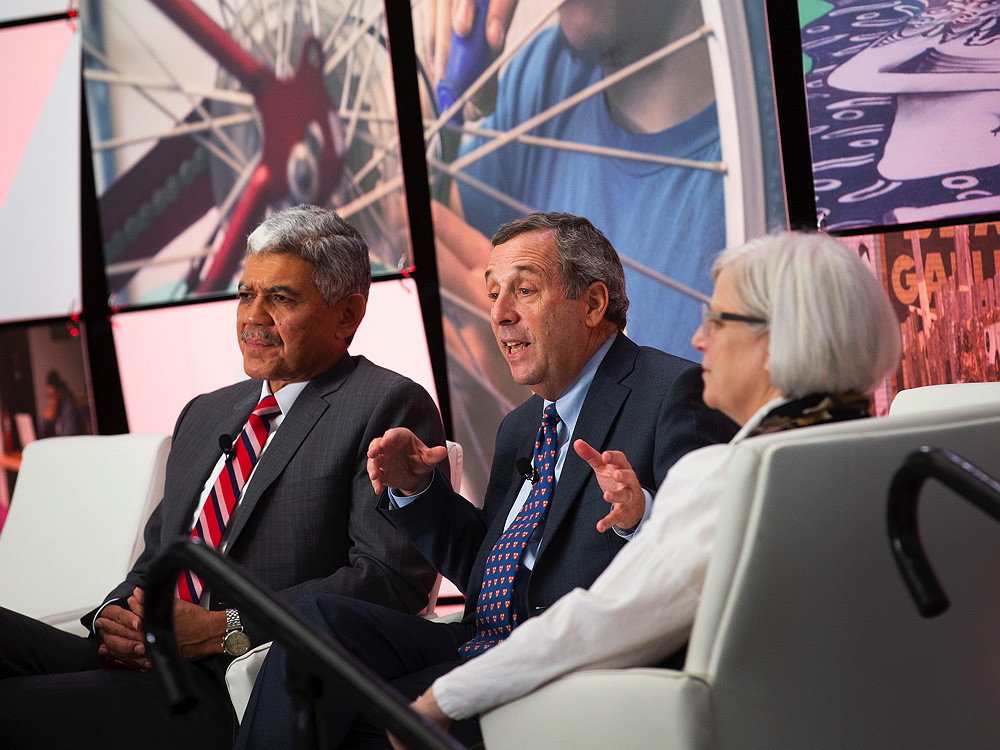 John Rosenberg also wrote about how travel funds, made possible by reader donations, not only allowed him to travel to Michigan to report on Harvard president Larry Bacow’s project to partner with the University of Michigan to combat inner-city poverty and the opioids crisis in that state, but also enabled Lydialyle Gibson to return to the state later to cover the the first Harvard-UM opioids conference. Read Rosenberg’s letter here.
John Rosenberg also wrote about how travel funds, made possible by reader donations, not only allowed him to travel to Michigan to report on Harvard president Larry Bacow’s project to partner with the University of Michigan to combat inner-city poverty and the opioids crisis in that state, but also enabled Lydialyle Gibson to return to the state later to cover the the first Harvard-UM opioids conference. Read Rosenberg’s letter here.